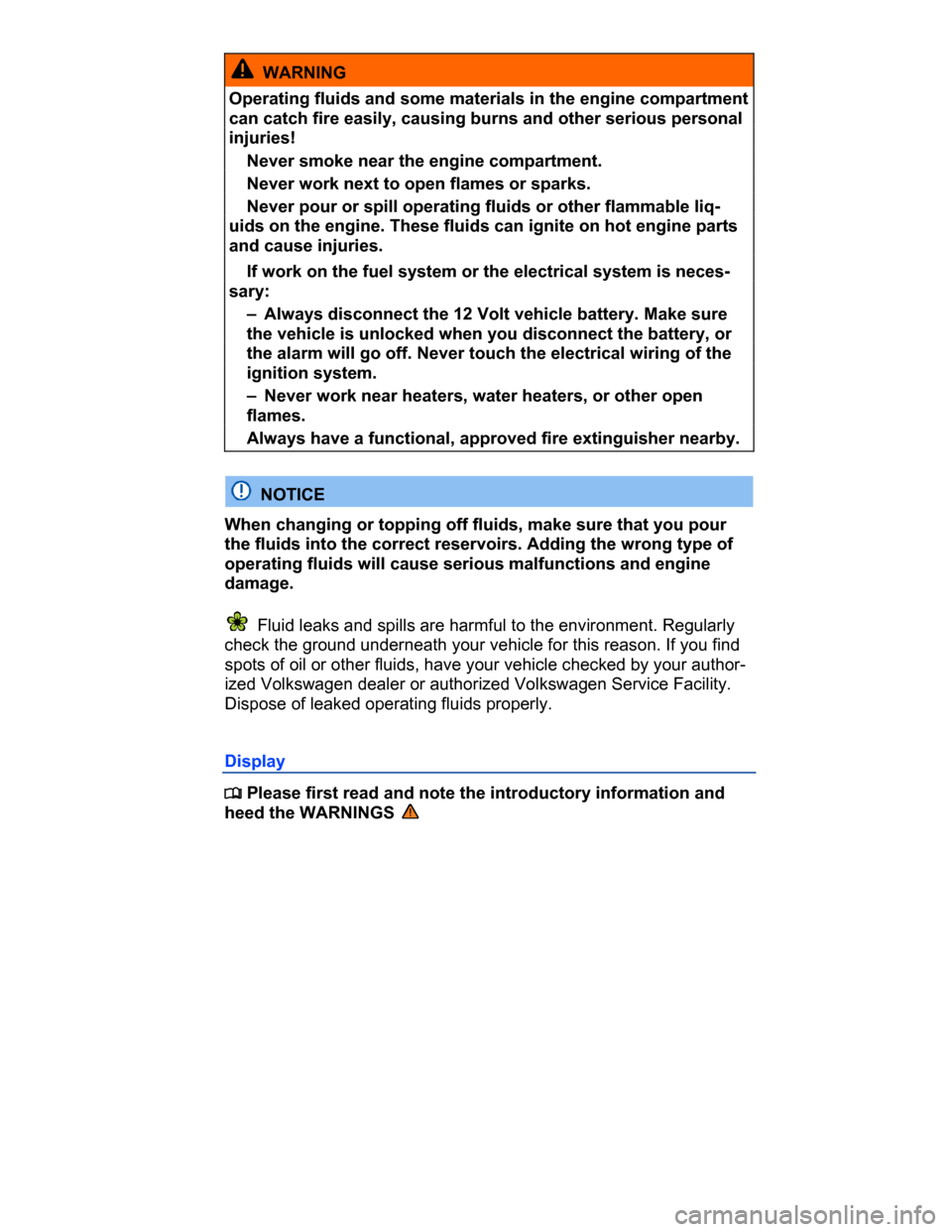Page 344 of 578

Brake booster
The brake booster works only when the engine is running. It increas-
es the force on the brakes above and beyond the pressure put on the
brake pedal by the driver.
If the brake booster is not working, or if the vehicle has to be towed,
you will have to push the brake pedal harder to make up for the lack
of booster assistance and the resulting longer stopping distance ⇒ .
WARNING
New brake pads do not provide maximum braking performance.
� New brake pads do not have the best stopping power for the
first 200 miles (320 km) and must be “broken in.” You can com-
pensate for the slightly reduced braking force by putting more
pressure on the brake pedal.
� Drive with extra care while the new brake pads are being bro-
ken in. This reduces the risk of collisions and serious personal
injuries due to a loss of control over the vehicle.
� Never follow other vehicles too closely or put yourself into
other situations that might require sudden, hard braking, espe-
cially when the brake pads have not been broken in.
WARNING
Overheated brakes will reduce the vehicle's stopping power
and increase stopping distances considerably.
� When driving downhill, the brakes have to work especially
hard and heat up quickly.
� Before driving downhill, especially on hills that are long or
steep, always reduce speed and shift into lower gear (manual or
automatic transmission). This will let the vehicle use engine
braking and reduce the load on the brakes. Otherwise, the
brake system could overheat and possibly fail. Only use the
brakes when you need them to slow the vehicle down more or
to stop.
� A damaged front spoiler or a non-standard spoiler can re-
duce airflow to the brakes and make them overheat.
Page 359 of 578

Adjust the tire pressure
The proper tire pressure helps reduce rolling resistance as well as
fuel consumption.
When purchasing new tires, always make sure that the tires are opti-
mized for lower rolling resistance.
Use low viscosity engine oil
Fully “synthetic,” low viscosity engine oils that expressly comply with
Volkswagen oil quality standards reduce fuel consumption. Low vis-
cosity engine oils reduce the frictional resistance on the engine and
are distributed more evenly and quickly, particularly when cold-
starting the engine. The effect is particularly apparent in vehicles that
frequently travel short distances.
Always ensure the right engine oil level is maintained and keep to the
scheduled service intervals (engine oil changes).
Make sure the engine oil that you purchase expressly complies with
Volkswagen oil quality standards and is the oil approved by
Volkswagen for your vehicle.
Avoid unnecessary weight
The lighter the vehicle, the more economical and eco-friendly it will
be. For example, an extra 220 lbs (100 kg) of weight increases fuel
consumption by up to 1 pint per 60 miles (0.3 l/100 km).
Remove all unnecessary items and unnecessary dead weight from
the vehicle.
Remove unnecessary aftermarket components
The more aerodynamic the vehicle, the less fuel it will consume. Af-
termarket components such as bicycle racks reduce its aerodynamic
performance.
Therefore, remove unnecessary structures and unused rack systems,
particularly if planning to drive at higher speeds.
Page 415 of 578

WARNING
Operating fluids and some materials in the engine compartment
can catch fire easily, causing burns and other serious personal
injuries!
� Never smoke near the engine compartment.
� Never work next to open flames or sparks.
� Never pour or spill operating fluids or other flammable liq-
uids on the engine. These fluids can ignite on hot engine parts
and cause injuries.
� If work on the fuel system or the electrical system is neces-
sary:
– Always disconnect the 12 Volt vehicle battery. Make sure
the vehicle is unlocked when you disconnect the battery, or
the alarm will go off. Never touch the electrical wiring of the
ignition system.
– Never work near heaters, water heaters, or other open
flames.
� Always have a functional, approved fire extinguisher nearby.
NOTICE
When changing or topping off fluids, make sure that you pour
the fluids into the correct reservoirs. Adding the wrong type of
operating fluids will cause serious malfunctions and engine
damage.
Fluid leaks and spills are harmful to the environment. Regularly
check the ground underneath your vehicle for this reason. If you find
spots of oil or other fluids, have your vehicle checked by your author-
ized Volkswagen dealer or authorized Volkswagen Service Facility.
Dispose of leaked operating fluids properly.
Display
�
Page 420 of 578
Page 422 of 578
For vehicles with the 3.6 liter engine, the engine oil temperature can
be displayed in the Volkswagen Information System MFI menu ⇒ MFI
menu (Multi-Function Indicator).
WARNING
Failure to heed warning lights and instrument cluster text mes-
sages can cause the vehicle to break down in traffic and result
in a collision and serious personal injury.
� Never ignore warning lights or text WARNINGS.
� Always stop the vehicle as soon as it is safe to do so.
NOTICE
Failure to heed warning lights or text WARNINGS can result in
vehicle damage.
Engine oil specifications
�
Page 423 of 578

Your engine was factory-filled with a high-quality, “synthetic” all-
season engine oil that meets strict Volkswagen oil quality standards
and has a viscosity grade of SAE 5W-40 or SAE 5W-30. You can use
this oil for normal driving in all temperatures.
If you need to add oil between oil changes, use only a high quality oil
that expressly complies with the Volkswagen oil quality standard
specified for your vehicle's engine:
Engines Engine oil specification
200 hp (147 kW), 2.0L
VW 502 00
VW 503 00
VW 504 00
280 hp (206 kW), 3.6L
VW 501 01
VW 502 00
VW 503 00
At the time this Manual was printed, the engine oils available in the
U.S. that meet these Volkswagen standards are “synthetic” oils. This
does not mean, however, that any “synthetic” engine oil will meet
Volkswagen standards. Always use an approved oil that expressly
complies with the Volkswagen oil quality standard that applies to your
vehicle's engine.
General recommendations:
If “synthetic” oil that meets the applicable Volkswagen oil quality
standard with viscosity grade SAE 5W-40 or SAE 5W-30 is not avail-
able in your area, be sure to use a viscosity grade suitable for the
climate, season, and operating conditions that exist where the vehicle
is used. Make sure the oil meets the quality standard.
Engine oils are constantly being improved. Authorized Volkswagen
dealers and authorized Volkswagen Service Facilities are always up-
to-date regarding new developments and changes. Volkswagen
therefore recommends that you have the engine oil changed by an
authorized Volkswagen dealer or an authorized Volkswagen Service
Facility.
Page 424 of 578
NOTICE
� If you need to add oil and there is none available that meets
the Volkswagen oil quality standard your engine requires, you
may add a total of no more than 1/2 quart (0.5 liter) of a high-
quality “synthetic” oil that meets ACEA A3 specifications and
has a viscosity grade of SAE 5W-40 or SAE 5W-30.
� Use only a high quality engine oil that expressly complies with
the Volkswagen oil quality standard specified for your vehicle's
engine. Using any other oil can cause serious engine damage
that will not be covered by any Volkswagen Limited Warranty.
� Do not mix any lubricants or other additives into the engine
oil. Doing so can cause engine damage! Damage caused by the-
se kinds of additives are not covered by any Volkswagen Limited
Warranty.
Engine oil capacities
�
Page 425 of 578
Checking the engine oil level and adding oil
Fig. 165 Oil dipstick with engine oil level marks.
Fig. 166 In the engine compartment: Engine oil filler cap.
�